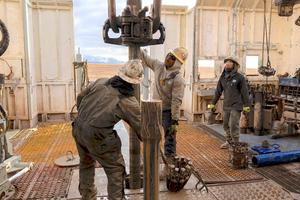“This is the first time that the German state has put air quality before the interests of the car industry,” says one expert.
The ruling could well portend the finale for diesel in Germany — or at least a game-changing reduction of its fleets on German and European roads — as well as the end of diesel’s favored status in European transportation policies. At the very least, of the 15 million diesel cars on German streets and autobahns today, the pre-2009 models, which can only be upgraded to meet air pollution standards at great expense, will be banned from restricted areas. And cars that rolled off assembly lines between 2009 and 2016 will have to undergo hardware retrofits costing about 1,300 euros to 2,500 euros — $1,600 to $3,100 — per car. The total price tag for the auto industry could be between 7.6 and 14.5 billion euros.
In the past year, sales of diesels fell 19.5 percent in Germany as a result of the trial of the DUH case and bad press, even though the industry claims that the newest models are much cleaner. The percentage of diesel cars among new vehicle registrations in Germany fell 25 percent in March 2018 compared to the previous March. And in the second-hand market, the value of used diesel models is in free fall.
“This is the first time that the German state has put air quality before the interests of the car industry and its workers,” says Gerhard Hofmann, director of the Berlin-based environmental consulting firm Agentuer Zukunft. Hofmann, however, doubts that the decree will change German automakers’ dedication to the internal combustion engine and fossil fuels. “They’ve fought change every step of the way and they’ll continue to as long as they can sell them,” says Hofmann, noting that the industry’s profits broke records in 2017.
“The bans are in part a symbolic victory,” says Sophia Becker of the Institute for Advanced Sustainability Studies in Potsdam, Germany, who acknowledges that diesel bans alone won’t neutralize urban air pollution, but sees them as “a step in the direction of quitting this system.” The court ruling “is more than about diesels. It questions our whole system of transportation, which in Germany until now has remained talk,” adds Becker, referring to calls for a low-carbon makeover of Germany’s transportation sector.
An activist, with the phrase "Kill Diesel Exhaust" printed on his face mask, at a protest in Frankfurt in September 2017. Maximilian Urschl / DUH
Resch says DUH’s aim is to prevent the 6,000 to 13,000 premature deaths each year in Germany from nitrogen dioxide pollution, which contributes to a variety of cardio-pulmonary diseases. Sixty percent of nitrogen dioxide comes from motor vehicles, and three-quarters of that is traced to diesels. In cities such as Munich, nitrogen dioxide and particulate matter levels are nearly double current European Union limits.
The German developments are already ricocheting across the EU, where diesel engines are a major contributor to an acute urban air pollution problem, says Margherita Tolotto of the European Environmental Bureau, an umbrella advocacy group based in Brussels. Forty-eight of 80 EU cities tested last year exceeded nitrogen dioxide emissions limits.
“The ruling will inspire localities to move against the polluters the way Stuttgart did,” Tolotto says. “And the EU will bring offending countries, like France and Italy, before the [EU] Court of Justice for failing to act. So, there’ll be pressure from below and above to make EU governments comply.” Shortly after the German decision in February, Rome’s mayor announced on her Facebook page that the city would ban diesel cars altogether by 2024. Paris, Copenhagen, London, and Madrid had already announced they are considering bans on some diesel cars beginning in 2020.
The February ruling was a rare and bracing slap for Germany’s storied carmakers, who have fought tooth and claw against diesel bans and count on German officialdom to back the industry, whatever the issue. Germany is the homeland of the diesel engine — Rudolf Diesel, a German, invented it — and until recently, diesels outsold gasoline-fueled vehicles in Europe. German-made diesels, including brand names such as BMW, Volkswagen, and Audi, have led the pack.
The German high court ruling comes against the backdrop of “dieselgate,” the German auto industry’s systematic fudging of emissions tests for its diesel fleet. That U.S. watchdogs and not German authorities exposed the manipulation is testimony to the pampering that the industry enjoys in Germany, Resch and others say. Still today, three years after dieselgate, more than half of new diesel models belch out pollutants many times in excess of air pollution standards, according to testing results obtained by Greenpeace.
The rapid adoption of diesel engines at the end of the 1990s was a well-intentioned response to climate change.
Furthermore, American owners of the rigged Volkswagen diesels were given the option of either a refund or an engine refit, as well as compensation payments. (VW set aside $26.7 billion to compensate owners globally.) In Germany, however, VW diesel drivers received only emission-lowering software updates, and those grudgingly, rather than the more costly engine refits — and they reaped not a single euro in compensation.
The rapid adoption of diesel engines at the end of the 1990s was a well-intentioned response to climate change. Diesel cars are propelled by an internal combustion process marginally different from that of gasoline engines. They’re more efficient, however, and thus expel significantly less carbon dioxide. But experts underestimated the degree to which diesel fuel produces exhaust gases thick with microscopic soot particles that enable carcinogens in the form of nitrogen dioxides to penetrate respiratory systems. Because of the carbon-dioxide bonus, European governments spent billions in subsidies and tax breaks to make diesel fuel cheaper than gasoline, which remains the case. The upshot: The share of diesel cars on Europe’s streets skyrocketed from around 3 percent in 1990 to 37 percent in 2015.
Resch’s organization has a staff of 90 and a budget of around 8 million euros, most of which comes from foundation and public funds, the EU, private sector donations, and court settlements. The NGO, with offices in Berlin, Hanover, and Lake Constance, boasts only 2,500 members. By way of comparison, Greenpeace Germany has 590,000 dues-paying members. “DUH is the most effective advocate for air quality because it fights for the actual enforcement of EU regulations,” says Becker. “Other environmental NGOs have the same ambitions, but they haven’t found such an effective way to make it happen.”
Environmentalist Jürgen Resch at an anti-diesel protest in Leipzig in February. Robert Lehmann / DUH
Resch — a garrulous, intense man with an edgy bearing — is a native of southern Germany’s Lake Constance region. As a student at Constance University in the 1970s, he fell in with West Germany’s burgeoning environmental movement and took up the cause of protecting Lake Constance, Europe’s third-largest lake, from development and agriculture.
In the 1980s, Resch joined forces with DUH, first battling for better recycling before campaigning for clean air across a reunited Germany. With Resch and DUH promoting the issue, Germany instituted regulations to lower the sulfur content of diesel fuels in Germany a decade before the EU wrote the same standards into law. And DUH pushed Germany to establish low-emissions zones in dozens of German cities; only vehicles with low levels of fine particulate matter could enter these zones – another precedent eventually adopted by the EU.
“Resch proved early on that he can organize extremely effective campaigns,” explains Malte Kreutzfeldt, environment editor of the newspaper Die Tageszeitung, who describes Resch as a classic, old-school environmentalist, one with almost missionary zeal. “He has an extraordinary grasp of details and he simply refuses to give up. He stays on an issue as long as it takes. This has been the DUH’s recipe.”
The German Justice Ministry certified DUH in the mid-2000s to employ judicial means to protect public interests such as the environment, health, and consumer rights. This status means that DUH can benefit financially from court-imposed fines or settlement payments, which flow into its budget. Over the years, DUH has filed lawsuits against hundreds of firms, cities, and institutions.
Now, as a consequence of the DUH’s legal battles, German cities will be the first to write the diesel ban into law.
Resch’s organization has filed 28 air-quality lawsuits against German cities, including Berlin, Mainz, and Frankfurt.
“This is huge,” gushes Resch, easily recognizable with his black plastic glasses and head of thick, disheveled white hair. “The court system in Germany actually does its job. Now some cities will introduce diesel bans. Others won’t. The holdouts we’ll take to court for violating air standards. We drop the lawsuit when they comply.” Ultimately, compliance means meeting EU air quality standards for nitrogen dioxide and particulae matter, which Resch says won’t be accomplished with halfway measures governing diesel emissions.
Resch’s organization has filed 28 air-quality lawsuits against German cities, including Berlin, Mainz, and Frankfurt. Hamburg is now finalizing the first official restrictions in Germany on diesel cars and trucks, which will take effect in late April. At first, older diesels will be proscribed on one main street in Hamburg, but other restricted roadways are expected to follow, including the exclusion of older diesel models from entire zones in some cities.
Automobile makers and their backers have sharply criticized the work of Resch and DUH, claiming that there are other, much less disruptive ways to reduce nitrogen dioxide pollution, such as the installation of emissions-reducing software in old diesels. They say that banning diesel cars from streets in city centers will only force diesel drivers to take other, probably longer routes.
“It’s easy to sue, but a lot harder to be constructive in helping solve difficult problems,” says Alexander Handschuh of Germany’s Association of Towns and Municipalities, an independent lobbying group.
Over the years, Resch and the DUH have been the objects of numerous suits initiated by the automobile industry and other polluters. The suits have charged Resch with conduct injurious to the interests of the companies. So far, he’s won every one of them.





